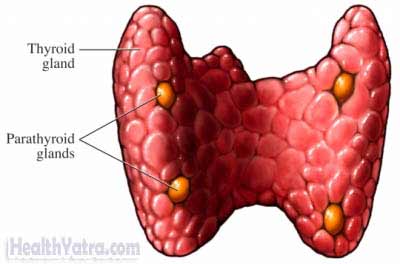Definition
The parathyroid glands are four small glands in the neck. They make parathyroid hormone (PTH). PTH raises the level of calcium in the blood.
In hyperparathyroidism, too much PTH is secreted. This causes high levels of calcium in the blood. High calcium is known as hypercalcemia. The condition is classified as being:
- Primary—most common form, a benign tumor of the parathyroid gland makes too much PTH on its own
- Secondary—occurs in patients with long-standing kidney failure or a vitamin Ddeficient state (very common)
- Tertiary—also occurs in patients with very long-standing kidney failure, very often on dialysis
Causes
In most cases, the exact cause is not known. Factors that may contribute include:
- Primary hyperparathyroidism:
- Parathyroid cancer (very rare)
- Adenoma (benign tumor) in the parathyroid gland (accounting for 85% of primary hyperparathyroidism)
- Familial hyperparathyroidism
- Multiple endocrine neoplasia (MEN)
- Secondary hyperparathyroidism:
- Vitamin D deficiency (due to inadequate dietary intake, lack of sunlight exposure, or malabsorption, like celiac disease)
- Kidney failure or other medical problems that make the body resistant to the action of the parathyroid hormone
- Hyperplasia (enlargement) of the parathyroid glands (accounting for over 80% of secondary or tertiary hyperparathyroidism)
- Tertiary hyperparathyroidism:
- Hyperplasia (enlargement) of the parathyroid glands (accounting for over 80% of secondary or tertiary hyperparathyroidism)
- Other potential causes include:
- Radiation therapy to head or neck during childhood
Risk Factors
The following factors increase your chance of developing hyperparathyroidism:
- Sex: female (hyperparathyroidism is three times more common in women, especially after menopause)
- Age: older than 50 years
- Multiple endocrine neoplasia (an inherited disorder that affects the endocrine glands)
- Genetics that make you more likely to have hyperparathyroidism
Symptoms
If you experience any of these, do not assume it is due to this condition. The symptoms may be caused by other health conditions. If you have any one of them, see your doctor.
The degree of hypercalcemia, as well as the disease progress, will determine the symptoms. Your blood level of calcium must be elevated to have most cases of hyperparathyroidism. Symptoms commonly seen with primary hyperparathyroidism include the following:
- Constipation
- Nausea
- Vomiting
- Abdominal pain
- Headache
- Loss of appetite
- Thirst
- Frequent and sometimes painful urination due to kidney stones
- Lethargy
- Fatigue
- Muscle weakness
- Joint pain
- Memory loss
- Depression
- Heartburn
- Back pain
Diagnosis
Your doctor will ask about your symptoms and medical history. A physical exam will be done. You may be referred to a specialist. An endocrinologist is a specialist that focuses on hormones.
Tests may include the following:
- Blood tests—to measure calcium, phosphorus, magnesium, alkaline phosphatase, vitamin D, and PTH, kidney and liver function tests
- Urine test—a 24-hour urine collection to measure calcium excretion and kidney function (very important test)
- Neck ultrasound —a test that uses sound waves, not radiation, to detect a large parathyroid tumor (adenoma)
- Technetium 99m sestamibi scan—a nuclear medicine test that uses safe nuclear molecules to make pictures of the parathyroid glands to help locate a single parathyroid adenoma in primary hyperparathyroidism
- Bone density test —a test to measure bone loss and risk of fractures
- Abdominal x-ray —a test that uses radiation to take a picture of the structures inside the body; can show kidney stones caused by high calcium levels
Treatment
Talk with your doctor about the best plan for you. Depending on the type of hyperparathyroidism treatment options include the following:
- Primary hyperparathyroidism—surgery is curative, medicine is not indicated and will generally not help
- Secondary hyperaparthyroidism—if due to vitamin D deficiency:
- Vitamin D ergocalciferol or cholecalciferol —for treating secondary hyperparathyroidism due to vitamin D deficiency.
- Calcitriol (the most active vitamin D metabolite)—helps to reduce PTH production in secondary hyperparathyroidism in chronic kidney failure
- Cinacalcet —helps to lower PTH blood levels for secondary and tertiary hyperparathyroidism in chronic kidney disease or parathyroid cancer
Monitoring of Blood Calcium Levels
Your doctor may simply choose to regularly check your blood calcium levels. The doctor will also monitor you for possible complications. This may include regular bone density tests every 1-2 years.
Prevention
Adequate calcium intake may play a role in preventing hyperparathyroidism in women. Try to get recommended levels of calcium through dietary choices and supplements.

